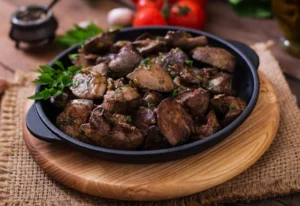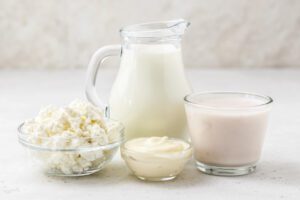
Nutrients are the key to our health and particularly important for growing bones and high energy levels. Although we all need the same nutrients, everyone requires different amounts of those nutrients depending on age, growth, and activity. Nutrients can generally be broken down into two categories: macronutrients—proteins, fats, and carbohydrates—and micronutrients—vitamins, minerals, and co-factors. Because both macro- and micronutrients have critical functions within the body, make sure you get the right balance of nutrients for optimal health and well-being. Children especially need the right nutrients in their diet to help them with the increased requirements from physical activity, growth spurts, and learning.
Here are our top 6 nutrients that should keep your child healthy, during all stages of growth:
1. Protein
The major building block of every cell in our body, protein is essential for life. There are proteins involved in helping your child’s body to break down food into energy, fight infections, and carry oxygen around the blood. There are 20 monomeric, “base” amino acids, from which we synthesise the proteins that help grow and repair our bodies. 9 are considered “essential” because our bodies cannot create them. Animal protein is considered a complete protein source because it contains all essential and conditionally essential aminos, plus it contains vitamins and minerals in highly bioavailable forms. Organ meats and shellfish are especially rich in essential nutrients. Start early with organ meat to give them a taste for it. In many cultures, liver is a “first food” for babies when they start on solids. It is important to note that you need to eat the fat with the meat, so don’t trim the fat, and definitely do not take notice of the “eat lean protein” nonsense.
As for plant foods, few contain all 9 essential amino acids, and some amino acids will be in inadequate amounts, e.g., methionine and cysteine. Many plant protein foods are highly processed with added oils and flavourings, and plant proteins are missing most of the nutrients and co-factors that animal proteins contain. Additionally, the bioavailability of plant proteins is lower than that of animal foods, so you could combine rice and beans to increase the amounts of the essential amino acids, but they will be half as bioavailable, and therefore you would have to eat at least twice as many calories.
Additionally, plant foods contain many defense chemicals that inhibit the digestion/absorption of nutrients. Tofu and tempeh are high in protein but should only be used occasionally or as a condiment, as they are in Asia. The few, truly vegetarian cultures around the world that raise their children without meat and fish experience far more health issues and even stunted growth and brain development issues. Proteins like carnitine, creatine, taurine, glycine, and carnosine are made in our body but often not at the level we require, so it is important to get those from food as well. These proteins are essential for healthy brain function, metabolism, muscle, digestion, and more, and they are not present in any plant foods. Research has shown that animal foods are advised as the basis of a child’s diet, chiefly because they are rich in bioavailable nutrients that are lacking or low in plant foods. Cultures that eat foods like rice and beans generally add meat and/or a bone broth to the dish, as well.
- Red meat
- Poultry
- Fish
- Eggs
- Organ meats – liver, kidneys, heart, etc
- Whole milk and cheese
- Rice and beans (usually with an animal protein as well)

2. Fats
Fats and cholesterol are essential for life and are found in every cell membrane. They have a major role in supporting skin health, moisture, and repair; assist with immune responses; and are a fuel source, particularly during sleep. Cholesterol is the base molecule for our steroid hormones and vitamin D. While we can synthesise fats and cholesterol in our body, it is necessary to have fat within your diet for your body to absorb the fat-soluble vitamins, D, E, K, and A, plus we only make around 80% of the cholesterol we need every day. Research has shown that children who eat a low-fat diet are more likely to be obese adults.
The omega-3 and -6 fatty acids are not made in our body, so we must obtain them from our diet. Healthy animal fats, including red meat, but especially fish, contain the essential omega-3 fatty acids, DHA and EPA, that are critical for brain health, development, and growth. Vegetable oils are highly refined, and the omega-6 to omega-3 ratio is too high. Nuts and seeds contain the precursor to useable omega-3s, DHA and EPA, called alpha-linolenic acid, but, unfortunately, the conversion to EPA, and especially DHA, is restricted in most of us. This is why it is important for children to consume animal fats and why traditional cultures prioritise animal foods for their youngsters.
- Animal fats – fatty meats, incl. fish
- Milk fats – Butter, ghee, full fat yoghurt, cheese
- Egg yolk
- Avocado
- Olive oil
- Coconut oil
- A few (preferably soaked and “activated”) nuts and seeds
3. Carbohydrates
Carbohydrate, in the form of glucose, is considered the main source of energy for the body—glucose is essential for a well-functioning brain, and some cells in the body, e.g., red blood cells, can only use glucose for energy. The body is very good at making glucose, but it is better to get all the things your body needs in your diet, wherever possible. Children, however, do require carbohydrates in their diet; otherwise, they may suffer from growth issues. Ketogenic diets are very popular nowadays; however, children placed on them for treatment reasons display stunting issues. Carbohydrates support mood hormones and help children to use fats and protein for building and tissue repair. Carbohydrates come in many forms, including root vegetables (e.g., kumara, potatoes, and carrots) and fruits and vegetables. Whole grains are not essential in the diet (all essential nutrients can be obtained through an animal-based diet with fruit and tubers) but can be used if prepared properly through soaking, sprouting, fermenting, and cooking. The most important thing to remember is to limit or omit highly processed foods and carbohydrates, except for traditional refined carbohydrate foods like white rice and traditional pastas.
- Pumpkin
- Kumara
- Potatoes
- Carrots
- Fruit
- Vegetables
- Rice
- Soaked/fermented porridge
4. Calcium

Calcium is essential for building strong bones and healthy teeth. But did you know that calcium is also important for energy production, immune system regulation, and nerve and heart function? Again, the best sources for calcium are animal foods because plant foods contain compounds which can inhibit the absorption of calcium and other minerals. Bioavailability of calcium in seeds can be increased by traditional plant food preparation methods (soaking/activating), but these should not be relied upon for the bulk of a child’s calcium needs. Choose dairy that has been processed as little as possible…unless the child has an allergy to dairy, or it is culturally inappropriate.
- Unprocessed animal milks
- Cheese and/or cream cheese
- Yogurt and/or kefir
- Tinned salmon with bones
- Bone meal
- Sterilised and powdered eggshells (functional food supplement)
- Activated sesame seeds
5. Iron
Necessary for healthy blood, iron aids normal cell function and carries oxygen into the cells all over the body to support energy levels. Iron is also essential for healthy brain function and mood. Iron comes in two forms: haem and non-haem iron. Haem-iron comes from animal foods, especially organ meats—liver is the richest source—and so animal foods should be prioritised. Non-haem iron comes from plants, is poorly absorbed, and requires vitamin C with the meal.
- Organ meats
- Red meats
- Shellfish
- Fish, pork, poultry
- Dark green leafy vegetables (poorly absorbed)
6. Vitamin C
An essential nutrient, Vitamin C cannot be stored within the body and must be consumed in the diet. Not only crucial for immune health; Vitamin C helps the body to heal wounds and reduces the development of bruises by strengthening the walls of blood vessels. Vitamin C helps keep gums and teeth healthy and supports the growth of strong bones.
- Citrus fruits
- Kiwifruit – especially gold
- Strawberries
- Blackcurrants
- Red peppers
- Broccoli
- Organ meats
Additional Nutrients
There are many other essential vitamins and minerals—the fat-soluble vitamins A, D3, K2, and E, for example—are critical for the development of your child’s teeth, skeleton, and facial structure, all of which, has implications for their health as an adult. Other essential minerals for growth and development, such as magnesium, iodine (very important at puberty), potassium, phosphorus, copper, and zinc, are more bioavailable in animal foods, but they can be obtained by traditionally preparing plant foods. Traditional preparation of these foods is outlined in detail at Weston A. Price Foundation’s website. If you and your family focus on…
- animal foods and their fats
- easily digestible carbohydrates like fruit, tubers, and the veg that the kids like
- utilising wholefoods only
- learning to process and prepare plant foods in the traditional ways
- and minimising or omitting junk and processed foods
…your children will have all the nutrients necessary to grow and learn. Teaching children about the importance of nutrition will help them develop good habits for the future.
